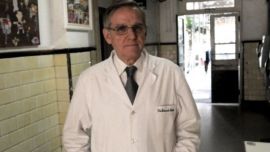There can be no doubt about this week’s big story being President Javier Milei blowing a multi-billion bubble with his promotion/diffusion of the ‘$LIBRA’ cryptocurrency (the Zodiac sign of his birthday, as it happens), only for it to burst in his face. At least two problems about making this the subject of today’s column, however. One is its slug: “Beyond the Headlines.” And another – does anybody above the age of 30 understand cryptocurrencies (even Economy Minister Luis Caputo disowns any comprehension “despite having it explained to me a million times”)? I know I don’t.
So what might the alternative be? One obvious strategy would be resorting to the search engine mojo to seek significant anniversaries of today’s date of “the triple two” (or three ducks). At least two of the many items on offer – the 13th anniversary of the Once rail tragedy and the Day of the Agronomist – are promising material here because they symbolise two areas continually underestimated or taken for granted by a libertarian government now further distracted by ‘Cryptogate,’ namely infrastructure and agriculture (with deficient rural transport an issue linking both).
The Once train crash was technically a railway accident far more frequently dubbed a tragedy and a crime in not a few eyes – few transport disasters have been so heavily politicised even if two previous rail accidents had claimed more lives. A Sarmiento line train pulling into Once railway station early in the morning exactly 13 years ago today simply failed to stop, resulting in an appalling death toll of 51 (including a pregnant woman) with almost 800 injured. At first sight it might seem that the sole culprit was the train-driver Marcos Córdoba but public opinion in general and the judicial system in particular were soon casting a wider net.
The Once tragedy came after a series of lesser train mishaps with few enough people inclined to attribute it to sheer bad luck – a Kirchnerite transport system grounded in heavily subsidised fares amounting to a couple of United States cents, absurdly overcrowded transport vehicles and deficient rolling stock in consequence, all run by corrupt crony capitalists, was widely seen as literally an accident waiting to happen. The death toll was massively increased by rush hour passengers huddling into the first two carriages for a head start to the also overcrowded buses waiting outside the station in the first workday after the Carnival weekend while the subsequent trial found major flaws in the train’s braking system. Then-president Cristina Fernández de Kirchner (fresh from a landslide win of 54 percent only four months previously) declared two days of national mourning but otherwise had nothing to say to a grieving nation, far less any self-criticism.
The public outcry found no immediate response from a sluggish judicial system yet once the trial began in 2014, justice was slow but sure. If the US comedian W.C. Fields never met a drink he did not like, federal judge Claudio Bonadio and prosecutor Federico Delgado (both of whom have since retired from life as well as the courtroom) would seem to have never met a potential Kirchnerite corruption scam they did not like and the writing was on the wall. A total of 21 defendants received prison sentences, including then-transport secretary Juan Pablo Schiavi and his predecessor Ricardo Jaime and two members of the Cirigliano clan running the Trenes de Buenos Aires concessionaires, but not federal planning minister Julio De Vido masterminding the populist pricing and crony capitalism. Yet De Vido’s impunity failed to survive the change of government in 2015 despite being elected deputy, being stripped of his parliamentary immunity to face trial and receive a 68-month prison sentence for fraudulent administration while acquitted on other charges.
That was then – where is infrastructure now? There is a case for saying that the Once tragedy was the beginning of the end for a Kirchnerism then “going for everything” and Javier Milei’s libertarian government has taken full advantage of a widespread equation of public works with corruption to make their elimination a prime contributor to fiscal surplus, throwing out the baby with the bathwater in the process. Infrastructural investment has been dogmatically defined as a responsibility of the private sector but this probably only works for energy projects – Vaca Muerta shale provides ample funding and incentive for these (thus making the since-renamed Néstor Kirchner pipeline a needless outlay of state funds in hindsight as reverse ideological dogmatism) but not all infrastructure offers the same profitable return on investment.
Least of all the kind of infrastructure which would enable Argentine farming to keep pace with the accelerated growth of Brazilian agriculture this century – the recent fiasco of the Hidrovía waterway tender governing the transportation of some 80 percent of Argentine grain exports is only the latest example with other transport factors such as inland roads and railways and ports receiving even less attention. The piecemeal privatisation of Belgrano Cargas freight lines recently announced almost represents regress towards developing an inland rail grid. Brazil is less fussy as to whether infrastructural funding is public or private and as a result its agricultural output has grown 150 percent this century as against 50 percent here.
Farmers also feel short-changed by ending export duties, the laziest levy of them all, being constantly subordinated to fiscal surplus. The recent temporary reduction of export duties until midyear was less motivated by giving farmers some relief (despite some dry weeks this summer) than by exchanging fiscal for monetary objectives in the form of the accumulation of Central Bank reserves – the export duty cuts only go to those who cash in 95 percent of their dollars within a fortnight.
Much more remains to be said about both agriculture and infrastructure but the main point here is to steer attention away from the far more virtual than virtuous world of cryptocurrency towards the real economy.



















Comments